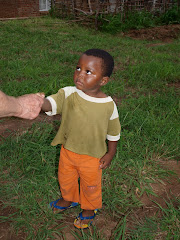
The more we learn about HIV/AIDS, the more we realize how much is still to be learned about the virus and the ultimate breakdown of the body’s immune system it triggers.
We also hear of things that seem to make sense on the surface, but perhaps need closer and possibly more scientific investigation to understand more completely.
When we were in Kenya in 2008, we visited an infant orphanage. We saw and held a healthy looking baby that had been rescued, after having been abandoned in a toilet immediately after birth. We were told that the infant tested HIV positive, but it’s HIV status had been reversed with nothing more than tender loving care and healthy nutrition. We were told that there is a window of opportunity in the case of infants born HIV positive where the infection can be reversed by this means alone.
We have tried to seek further confirmation of this, and have struggled to reconcile what we saw and heard with what we learn about HIV infection and detection. The following quote was helpful in this regard.
“When a new baby is born to an HIV-infected mother, there is no immediate way to know whether the baby is infected with the virus. This is because if the mother is infected, an ELISA test (which checks for HIV antibodies in the blood) will almost always be positive, too. Babies will have their HIV-infected mother's antibodies (which are passed to the baby through the placenta) even if they are not truly infected with HIV. These babies may remain HIV-antibody-positive for up to 18 months after birth, even if they are not actually infected.
Infants who are not actually infected with the virus (but are born to HIV-positive mothers) will not make their own antibodies; the HIV antibodies that came from their mothers will gradually disappear from their blood before they reach 2 years of age. Any blood tests performed after this point will likely be HIV-negative. Infants who are infected with HIV from their mothers will begin to make their own HIV antibodies and will generally remain HIV-positive after 18 months of age.
The most accurate diagnosis of HIV infection in early infancy comes from tests that show the presence of the virus itself (not HIV antibodies) in the body. These tests include an HIV viral culture and PCR (polymerase chain reaction), a blood test that looks for the DNA of the virus.
Older kids, teens, and adults are tested for HIV infection by an ELISA test to detect the presence of HIV antibodies in the blood. Antibodies are specific proteins that the body produces to fight infections; HIV-specific antibodies are produced in response to infection with HIV. Someone with antibodies against HIV is said to be HIV-positive. If the ELISA test is positive, it is always confirmed by another test called a Western blot. If both of these tests are positive, the patient is almost certainly infected with HIV.”
The above quote taken from http://kidshealth.org/parent/infections/std/hiv.html#
What we can say without fear of contradiction, is that loving tender care of infants and young children, coupled with a steady diet of healthy food, does make a world of difference. That's good enough motive for us to lavish love on them and work towards providing them with what they need.






No comments:
Post a Comment